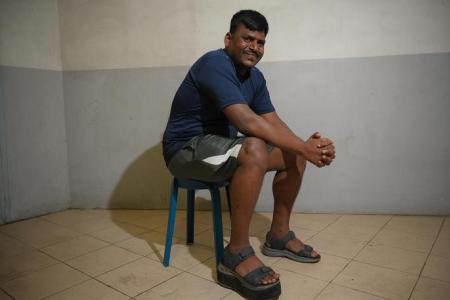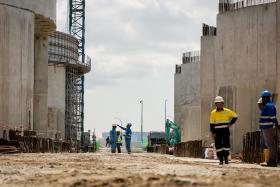Worker's leg almost severed by 250kg industrial fan
By the time he turned 30 in 2022, Indian national Pitchaiah Muthupandi thought he would be married, as his parents had planned an arranged marriage for him in India.
Instead, he found himself in hospital that year, with a mangled right leg due to a work accident.
His arranged marriage was soon called off and his bride-to-be wed someone else.
“My dream was all gone,” Mr Muthupandi, now 32, told The Straits Times on March 28 at Tuas Amenity Centre, about a 10-minute drive from his workplace. Workers usually eat and buy their daily necessities there.
He added: “(Before the accident), I felt my job was going onto the next level. But it all stopped. My life stopped too.”
The Indian national came to Singapore in 2016 and worked as a technician.
He joined his current firm in August 2021 as a service engineer, repairing motors and generators.
On Aug 8, 2022, Mr Muthupandi and a colleague were testing an industrial fan at their workplace. The fan’s six to eight blades spanned about 1m each, and its total weight was around 250kg.
Suddenly, the spinning fan – which was not bolted properly – spun out of the casing and hurtled towards Mr Muthupandi, who was standing several metres away. He tried to run, but the fan’s blades hit his right leg.
He blacked out and awoke in the intensive care unit at St Luke’s Hospital. The blades had sliced through his thigh bone and almost severed his right leg.
“My bone was totally broken. I thought my leg was gone,” Mr Muthupandi said.
Months of excruciating pain followed, with metal plates inserted into his thigh. Part of his thigh bone was cut and he suffered multiple infections.
Mr Muthupandi, who used to run 2km to 3km daily, underwent physiotherapy to learn how to walk again.
Today, his right leg is about 3cm to 5cm shorter than the left. He wears a special pair of sandals to make up for the difference in length. He can walk slowly without crutches.
Gesturing to his right thigh, he said: “This is not my body. My body is very, very fit.”
Mr Muthupandi was one of 614 workers who suffered a major injury at work in 2022.
The number of workplace major injury cases dropped to 590 in 2023. Major injuries refer to severe non-fatal injuries, which include amputations, blindness and fractures.
Workplace deaths dropped from 46 to 36 in the same period. Overall, the workplace fatality and major injury rates in 2023 dropped to a record low.
Mr Muthupandi has undergone three major operations, spent 10 months in and out of hospital, and did not work for 14 months.
Fortunately, his company paid his salary on time during that period and also took care of all his medical fees.
Mr Daniel Yeo, a senior caseworker at HealthServe, a healthcare charity for low-wage migrant workers, said that although this is mandated by law, this level of support from employers, as shown by Mr Muthupandi’s company, is uncommon for workers with work injuries.
Mr Muthupandi’s company also allowed him to return to work in October 2023 and he was reassigned a desk job writing service reports.
Before the accident, he had sent money home monthly to build a house, hoping to relocate his parents from their rented home.
He did not inform his parents about the accident for fear of disappointing them. But a friend told his sister about it. Then, his arranged marriage collapsed.
Ms Durga Arivan, HealthServe’s senior psychotherapist and manager of psychotherapy and counselling services, said: “There was a lot of anxiety (in him), not just because of the trauma, but also about the uncertainty and lack of clarity about how his health was going to be.”
Isolation made things worse.
Mr Muthupandi said his friends could not visit him in hospital due to Covid-19 restrictions, and when he was discharged, he stayed alone in a dormitory.
Mr Yeo was one of the few people who visited him.
Said the caseworker: “Every time I met up with him, I tried to give him hope and let him see there was a future.”
Mr Yeo also guided him through the Work Injury Compensation Act claim process, where employees can claim for work-related injuries or diseases without filing a civil suit.
Mr Muthupandi got enough compensation to fully pay for his house and his younger sister’s wedding.
He plans to go home in May for the first time since the accident.
He said: “I’ll cry, only cry. (My mother) will also cry.
“Every day, (my parents) call me asking if my leg is okay. I say, yes, I’m walking normally.”
Today, Mr Muthupandi lives by what his counsellors told him: “What happened, happened already. Move on. You still have a long life to go.”
Get The New Paper on your phone with the free TNP app. Download from the Apple App Store or Google Play Store now


